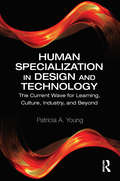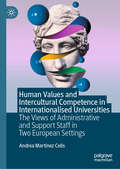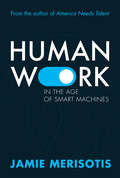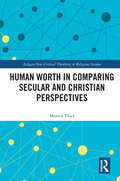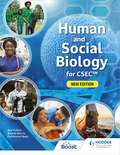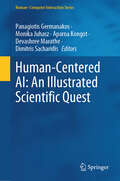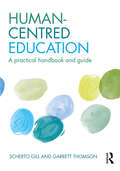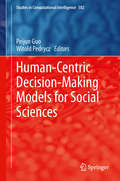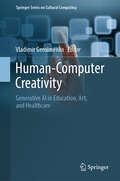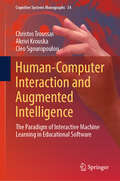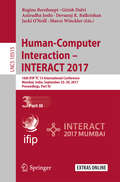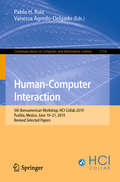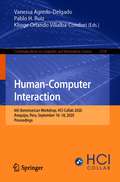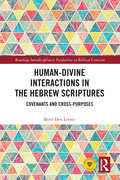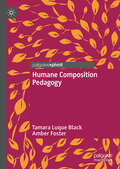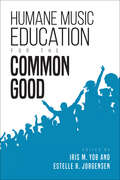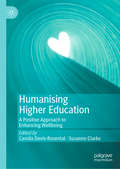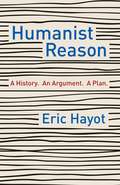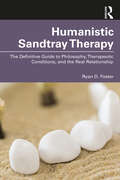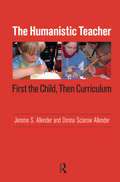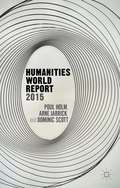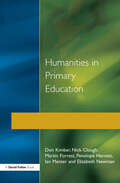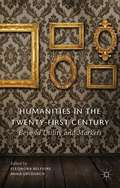- Table View
- List View
Human Specialization in Design and Technology: The Current Wave for Learning, Culture, Industry, and Beyond
by Patricia A. YoungHuman Specialization in Design and Technology explores emerging trends in learning and training—standardization, personalization, customization, and specialization—with a unique focus on innovations specific to human needs and conditions. Analyzing evidence from current academic research as well as the popular press, this concise volume defines and examines the trajectory of instructional design and technologies toward more human-centered and specialized products, services, processes, environments, and systems. Examples from education, healthcare, business, and other sectors offer real-world demonstrations for scholars and graduate students of educational technology, instructional design, and business development. The book features insights into the future of professors, public schools, equity and access, extended technologies, open educational resources, and more, concluding with a set of concrete solutions.
Human Values and Intercultural Competence in Internationalised Universities: The Views of Administrative and Support Staff in Two European Settings
by Andrea Martínez CelisThis book investigates the perceptions of the administrative and support staff at two universities (one in Spain, the other in the Netherlands) regarding internationalisation in their institutions and their own perceived intercultural competence within their contexts. Using the Schwartz value system, the author aims also to understand and explore how human values relate to attitudes and intercultural competence more broadly. The book argues for the importance of intercultural competence of administrative and support staff in internationalised universities, as well as their key role as essential agents in promoting internationalisation. The author proposes an interdisciplinary method to evaluate intercultural competence from an emic perspective—through questionnaires and interviews—and from an etic perspective—analysing participants’ discursive constructions to reveal their human values. This volume will be of interest to academics and practitioners in fields such as linguistics, intercultural competence, intercultural and cross-cultural studies, internationalisation of higher education, and sociology.This book investigates the perceptions of the administrative and support staff at two universities (one in Spain, the other in the Netherlands) regarding internationalisation in their institutions and their own perceived intercultural competence within their contexts. Using the Schwartz value system, the author aims also to understand and explore how human values relate to attitudes and intercultural competence more broadly. The book argues for the importance of intercultural competence of administrative and support staff in internationalised universities, as well as their key role as essential agents in promoting internationalisation. The author proposes an interdisciplinary method to evaluate intercultural competence from an emic perspective—through questionnaires and interviews—and from an etic perspective—analysing participants’ discursive constructions to reveal their human values. This volume will be of interest to academics and practitioners in fields such as linguistics, intercultural competence, intercultural and cross-cultural studies, internationalisation of higher education, and sociology.
Human Work in the Age of Smart Machines
by Jamie MerisotisA public policy leader addresses how artificial intelligence is transforming the future of labor—and what we can do to protect the role of workers. As computer technology advances with dizzying speed, human workers face an ever-increasing threat of obsolescence. In Human Work In the Age of Smart Machines, Jamie Merisotis argues that we can—and must—rise to this challenge by preparing to work alongside smart machines doing that which only humans can: thinking critically, reasoning ethically, interacting interpersonally, and serving others with empathy. The president and CEO of Lumina Foundation, Merisotis offers a roadmap for the large-scale, radical changes we must make in order to find abundant and meaningful work for ourselves in the 21st century. His vision centers on developing our unique capabilities as humans through learning opportunities that deliver fair results and offer a broad range of credentials. By challenging long-held assumptions and expanding our concept of work, Merisotis argues that we can harness the population&’s potential, encourage a deeper sense of community, and erase a centuries-long system of inequality.
Human Worth in Comparing Secular and Christian Perspectives (Ashgate New Critical Thinking in Religious Studies See Series ID 2069)
by Monica ThielThis book integrates secular literature such as psychology, sociology, management, and organization studies with Christian and spiritual biblical literature. This book explores the importance of human worth in our personal and professional lives through an interdisciplinary approach that integrates human and societal worth with Christian and spiritual worth. Moreover, the book highlights values that receive little or no attention in secular literature. Overall, this book shows readers how human worth is often manipulated and undermined within societal worth in contrast to Christian worth with implications for cultivating leadership and education. This book focuses more on the biblical texts rather than the theological differences. In addition, this book situates itself on common biblical interests across Christian church denominations worldwide rather than exploring more on the secular cultural differences. This book positions itself from a non-denominational and Western perspective with a focus on biblical texts, theology, and secular literature.Readers that would be interested in this book are scholars and students in religion, ethics, and spirituality.
Human and Social Biology for CSEC
by Ann FullickProvide a comprehensive and engaging student-centred approach to Human and Social Biology with an updated textbook aligned to the latest CSEC syllabus for examination from June 2022. - Cover all topics with brand new content on the environment, diseases and pandemics with a full focus on their impact in the Caribbean - Develop subject knowledge with 'Did you know?' features; and consolidate learning using objectives, end of section checkpoint questions and summaries within each chapter- Create meaningful links with 'The Biologist's Toolkit' feature to strengthen maths, science and language skills needed to meet the course objectives- Support application of practical tasks via step-by-step guidance on how to research, present and analyse data, and come to realistic conclusions and recommendations - Avoid common errors with an increased focus on 'What the Examiners say' for problem topicsAdded for the eBook- Aid visual learning using diagrams, illustrations, video links and demonstrations in the eBook
Human and Social Biology for CSEC
by Ann FullickProvide a comprehensive and engaging student-centred approach to Human and Social Biology with an updated textbook aligned to the latest CSEC syllabus for examination from June 2022. - Cover all topics with brand new content on the environment, diseases and pandemics with a full focus on their impact in the Caribbean - Develop subject knowledge with 'Did you know?' features; and consolidate learning using objectives, end of section checkpoint questions and summaries within each chapter- Create meaningful links with 'The Biologist's Toolkit' feature to strengthen maths, science and language skills needed to meet the course objectives- Support application of practical tasks via step-by-step guidance on how to research, present and analyse data, and come to realistic conclusions and recommendations - Avoid common errors with an increased focus on 'What the Examiners say' for problem topicsAdded for the eBook- Aid visual learning using diagrams, illustrations, video links and demonstrations in the eBook
Human-Centered AI: An Illustrated Scientific Quest (Human–Computer Interaction Series)
by Panagiotis Germanakos Monika Juhasz Aparna Kongot Devashree Marathe Dimitris SacharidisEmbark on a captivating exploration of human-centered computing and AI, where the convergence of technology and human interaction unveils a world of endless possibilities. In the age of wireless communication, pervasive computing, and the Internet of Things, the synergy between humans and machines has never been more profound. This book delves deep into the heart of this symbiotic relationship, shedding light on the intricate dynamics that define our digital landscape. From the humble human-computer communications, via simple interaction points, to the complex web of virtual networks, every aspect of this journey is meticulously examined. Through a lens of innovation and insight, we navigate within the complex terrain of user actions, individual differences, and algorithmic computations. At the core of our exploration lies a quest for understanding—a quest that transcends the boundaries of traditional research and ventures into the realm of cutting-edge technology. Special emphasis is placed on promoting original insights and paradigms, incorporating aspects derived from psychological theory and individual differences in adaptive computational systems and recommenders. Our goal is simple yet ambitious: by enhancing explainability, fairness, transparency, and decreasing bias during interactions, to empower users with greater control and understanding of the technologies that shape their lives. Through a blend of visual storytelling and specialized textual contributions, we invite you to join us on this extraordinary journey. Whether you're a researcher, practitioner, or enthusiast in the field of AI and human-computer interaction, this book offers valuable insights and perspectives. Prepare to be inspired, enlightened, and empowered through this transformative journey as we unlock the true potential of technology in service of humanity.
Human-Centred Education: A practical handbook and guide
by Garrett Thomson Scherto GillHuman-Centred Education (HCE) radically rethinks the aims of education, the nature of learning, and the relationship between individuals in schools. This accessible guide presents a HCE approach to schooling and includes a variety of rich pedagogical examples. It provides practical suggestions as to how the approach might be adopted as a whole-school initiative, or else woven into particular aspects of existing school life, including the curriculum, classroom culture and feedback for learning. This handbook also illustrates how holistic educational practices, found in some alternative schools, can be introduced fruitfully into the state educational system with step-by-step guidance on how to integrate HCE into teacher training and school governance. HCE is more than a set of inflexible pedagogical prescriptions or a recipe of lesson plans. It originates from the fundamental values of care, positive relationships and well-being. National education policies tend to ignore deeper educational processes, such as the cultivation of qualities that are central to living meaningfully and well, because they focus on measured, high-stakes academic performance. HCE is an effective antidote to this, and brings to the fore a more human-centred approach without sacrificing academic standards. Current secondary teachers, members of school management and leadership teams, as well as those currently undertaking teacher training will all benefit from reading this important book.
Human-Centric Decision-Making Models for Social Sciences
by Witold Pedrycz Peijun GuoThe volume delivers a wealth of effective methods to deal with various types of uncertainty inherently existing in human-centric decision problems. It elaborates on comprehensive decision frameworks to handle different decision scenarios, which help use effectively the explicit and tacit knowledge and intuition, model perceptions and preferences in a more human-oriented style. The book presents original approaches and delivers new results on fundamentals and applications related to human-centered decision making approaches to business, economics and social systems. Individual chapters cover multi-criteria (multiattribute) decision making, decision making with prospect theory, decision making with incomplete probabilistic information, granular models of decision making and decision making realized with the use of non-additive measures. New emerging decision theories being presented as along with a wide spectrum of ongoing research make the book valuable to all interested in the field of advanced decision-making. The volume, self-contained in its nature, offers a systematic exposure to the concepts, design methodologies, and detailed algorithms. A prudent balance between the theoretical studies and applications makes the material suitable for researchers and graduate students in information, computer sciences, psychology, cognitive science, economics, system engineering, operation research and management science, risk management, public and social policy.
Human-Computer Creativity: Generative AI in Education, Art, and Healthcare (Springer Series on Cultural Computing)
by Vladimir GeroimenkoThis pioneering volume showcases how generative AI has evolved from a mere tool to a creative partner, transforming the boundaries of innovation and collaboration across various disciplines. With contributions from 53 global experts spanning 21 countries, this comprehensive resource explores the transformative impact of AI on education, art, and healthcare. It reveals how AI enhances learning experiences, fosters new artistic expressions, and revolutionises patient care and medical research. Organised into five thematic parts, the book offers a balanced mix of conceptual frameworks, case studies, and practical insights, providing readers with a thorough understanding of how human ingenuity and artificial intelligence intersect to solve problems, inspire creativity, and redefine industries. Whether you are an academic, practitioner, or inquisitive reader, this volume invites you to engage with the cutting-edge possibilities of generative AI and embrace the future of human-computer collaboration.
Human-Computer Interaction and Augmented Intelligence: The Paradigm of Interactive Machine Learning in Educational Software (Cognitive Systems Monographs #34)
by Christos Troussas Akrivi Krouska Cleo SgouropoulouThis book explores the transformative roles of human-computer interaction (HCI) and augmented intelligence (AI) in shaping intelligent systems. HCI focuses on designing interactive systems that enhance human-technology relationships, while AI empowers users with adaptive, data-driven tools that complement decision-making. Together, these fields drive innovation, creating systems that are efficient, intuitive, and inclusive, addressing diverse user needs across various domains. Central to this work is the paradigm of interactive machine learning (IML), which builds on HCI and AI principles to create adaptive systems capable of evolving in real-time. The book highlights the application of IML in educational software, demonstrating how dynamic, personalized, and responsive learning environments can enhance student engagement and success. It provides detailed case studies and practical examples that showcase how IML aligns educational content, feedback, and interactions with learner behaviors and preferences. Additionally, it includes numerous Python code implementations and actionable design strategies, making these concepts accessible to practitioners and researchers alike. Key topics include leveraging cognitive and communication styles to shape adaptive systems, integrating learning models to enhance personalization, and addressing ethical considerations such as data privacy and algorithmic fairness. Readers will also discover discussions on creating personalized tutoring systems, collaborative platforms, and immersive environments that redefine educational technology. This book is a valuable resource for researchers, software developers, educators, instructional designers, and technologists at the intersection of human-computer interaction, augmented intelligence, and educational innovation. With its comprehensive framework and practical insights, it offers the tools to design adaptive, inclusive, and impactful learning systems for the future.
Human-Computer Interaction – INTERACT 2017: 16th IFIP TC 13 International Conference, Mumbai, India, September 25–29, 2017, Proceedings, Part III (Lecture Notes in Computer Science #10515)
by Regina Bernhaupt Marco Winckler Girish Dalvi Anirudha Joshi Devanuj K. Balkrishan Jacki O'NeillThe four-volume set LNCS 10513—10516 constitutes the proceedings of the 16th IFIP TC 13 International Conference on Human-Computer Interaction, INTERACT 2017, held in Mumbai, India, in September 2017. The total of 68 papers presented in these books was carefully reviewed and selected from 221 submissions. The contributions are organized in topical sections named: Part I: adaptive design and mobile applications; aging and disabilities; assistive technology for blind users; audience engagement; co-design studies; cultural differences and communication technology; design rationale and camera-control. Part II: digital inclusion; games; human perception, cognition and behavior; information on demand, on the move, and gesture interaction; interaction at the workplace; interaction with children. Part III: mediated communication in health; methods and tools for user interface evaluation; multi-touch interaction; new interaction techniques; personalization and visualization; persuasive technology and rehabilitation; and pointing and target selection.
Human-Computer Interaction: 5th Iberoamerican Workshop, HCI-Collab 2019, Puebla, Mexico, June 19–21, 2019, Revised Selected Papers (Communications in Computer and Information Science #1114)
by Vanessa Agredo-Delgado Pablo H. RuizThis book constitutes the proceedings of the 5th Iberoamerican Workshop on Human-Computer Interaction, HCI-Collab 2019, held in Puebla, Mexico, in June 2019.The 31 full papers presented in this volume were carefully reviewed and selected from 55 submissions. The papers describe models, design patterns, implementations, evaluations of existing applications, and systemic reviews; all of which are very important aspects within HCI.
Human-Computer Interaction: 6th Iberomarican Workshop, HCI-Collab 2020, Arequipa, Peru, September 16–18, 2020, Proceedings (Communications in Computer and Information Science #1334)
by Vanessa Agredo-Delgado Pablo H. Ruiz Klinge Orlando Villalba-CondoriThis book constitutes the thoroughly refereed proceedings of the 6th Iberoamerican Workshop on Human-Computer Interaction, HCI-Collab 2020, held in Arequipa, Peru, in September 2020.*The 28 full and 3 short papers presented in this volume were carefully reviewed and selected from 128 submissions. The papers deal with topics such as emotional interfaces, usability, video games, computational thinking, collaborative systems, IoT, software engineering, ICT in education, augmented and mixed virtual reality for education, gamification, emotional Interfaces, adaptive instruction systems, accessibility, use of video games in education, artificial Intelligence in HCI, among others. *The workshop was held virtually due to the COVID-19 pandemic.
Human-Divine Interactions in the Hebrew Scriptures: Covenants and Cross-Purposes (Routledge Interdisciplinary Perspectives on Biblical Criticism)
by Berel Dov LernerThis book addresses central theological issues and biblical narratives in terms of a bold thesis regarding relations between God and humans: that the actions of God and the actions of humans are informed by independently valid moral viewpoints which do not entirely overlap. The author suggests that God’s plans and actions refl ect the interests and obligations appropriate to His goal of creating a worthy world, but not necessarily our world. In contrast, humans must attend to special obligations grounded in their dependence on their existing created world and in their particular places in the human family. However, in acts of grace, God voluntarily takes on special obligations toward the created world by entering covenants with its inhabitants. When the covenant involves reciprocal obligations, as in the case of God’s covenant with Israel, it also recruits human beings to play conscious roles in God’s larger plans. These covenants frame the moral parameters of human-divine interaction and cooperation in which each party strains to negotiate confl icts between its original duties and the new obligations generated by covenants. The interpretive discussions in this book involve close readings of the Hebrew text and are also informed by rabbinic tradition and Western philosophy. They address major issues that are of relevance to scholars of the bible, theology, and philosophy of religion, including the relationship between divine commands and morality, God’s responsibility for human suff ering, God’s role in history and the intersection between politics and religion.
Human-Divine Interactions in the Hebrew Scriptures: Covenants and Cross-Purposes (Routledge Interdisciplinary Perspectives on Biblical Criticism)
by Berel Dov LernerRabbi Sacks Book Prize Finalist 2024. This book addresses central theological issues and biblical narratives in terms of a bold thesis regarding relations between God and humans: that the actions of God and the actions of humans are informed by independently valid moral viewpoints which do not entirely overlap. The author suggests that God’s plans and actions refl ect the interests and obligations appropriate to His goal of creating a worthy world, but not necessarily our world. In contrast, humans must attend to special obligations grounded in their dependence on their existing created world and in their particular places in the human family. However, in acts of grace, God voluntarily takes on special obligations toward the created world by entering covenants with its inhabitants. When the covenant involves reciprocal obligations, as in the case of God’s covenant with Israel, it also recruits human beings to play conscious roles in God’s larger plans. These covenants frame the moral parameters of human-divine interaction and cooperation in which each party strains to negotiate confl icts between its original duties and the new obligations generated by covenants. The interpretive discussions in this book involve close readings of the Hebrew text and are also informed by rabbinic tradition and Western philosophy. They address major issues that are of relevance to scholars of the bible, theology, and philosophy of religion, including the relationship between divine commands and morality, God’s responsibility for human suff ering, God’s role in history and the intersection between politics and religion.
Humane Composition Pedagogy
by Tamara Luque Black Amber FosterHumane Composition Pedagogy (HCP) provides a pedagogical framework for reconciling the current disconnect between neoliberal higher education policies (sometimes called the &“business model&” of higher education) and the demand for kinder and more human-centered instruction. Humane education is a pedagogical model, with origins in secondary education, that considers emotional wellbeing, civic engagement, and intrinsic motivation as central to learning. The authors suggest that humane pedagogies can and should be adapted to higher education contexts, as a means of synthesizing literatures on the pedagogies of inclusion and care from noteworthy scholars including Jamil Zaki, Lisa Blankenship, Asao B. Inoue, Ruchika Tulshyan, and more. Without feeding a crisis narrative or calling for a complete systemic overhaul, HCP offers both an alternative to, and an act of resistance against, dehumanizing forces in today&’s colleges and universities. In exploring its three tenets–empathy, wellbeing, and belonging–the authors call for improved collaboration among key stakeholders (faculty, students, and administrators) to center the human experience in how we approach college instruction, thereby allowing universities to better fulfill their educational missions.
Humane Music Education for the Common Good (Counterpoints: Music and Education)
by Iris M. Yob and Estelle R. JorgensenWhy teach music? Who deserves a music education? Can making and learning about music serve the common good? A collection of essays considers the answers.In Humane Music Education for the Common Good, scholars and educators from around the world offer unique responses to the recent UNESCO report titled Rethinking Education: Toward the Common Good. This report suggests how, through purpose, policy, and pedagogy, education can and must respond to the challenges of our day in ways that respect and nurture all members of the human family.The contributors use this report as a framework to explore the implications and complexities that it raises. The book begins with analytical reflections on the report and then explores pedagogical case studies and practical models of music education that address social justice, inclusion, individual nurturance, and active involvement in the greater public welfare. The collection concludes by looking to the future, asking what more should be considered, and exploring how these ideals can be even more fully realized. This volume boldly expands the boundaries of the UNESCO report to reveal new ways to think about, be invested in, and use music education as a center for social change both today and going forward.
Humanising Higher Education: A Positive Approach to Enhancing Wellbeing
by Camila Devis-Rozental Susanne ClarkeThis book explores humanising practice within higher education (HE). It provides a fresh perspective by bringing together expert voices with empirical experience of humanising theory and practice in various areas of higher education, in order to influence and improve the way in which universities work.The book draws on Todres et. al’s humanisation framework, as well other relevant theories such as positive organisational scholarship, Vygotsky’s socio-cultural theory and socio-emotional intelligence. Topics include micro elements of humanisation such as transitions and the student experience, and macro elements such as the policy impact of humanising HE and sustainability. The authors demonstrate how a humanising approach can provide the catalyst for wider change and help to improve wellbeing in the community. This book offers an invaluable resource for scholars interested in teaching and learning in HE, and for HE practitioners and policy makers keen to develop a more human practice.
Humanist Reason: A History. An Argument. A Plan
by Eric HayotAsk just about any humanist, and you will hear that the humanities are in a crisis. Facing utilitarian approaches to education, the corporatization of the university, plummeting enrollments, budget cuts, and political critiques from right, left, and center, humanists find themselves on the defensive. Eric Hayot argues that it is time to make a positive case for what the humanities are and what they can become.Hayot challenges scholars and students in the humanities to rethink and reconsider the work they do. Examining the origins of the humanist ethos in nineteenth-century Germany and tracing its philosophical roots back to Immanuel Kant, Hayot returns to the history of justifications for the humanities in order to build the groundwork for their future development. He develops the concept of “humanist reason” to understand the nature of humanist intellectual work and lays out a series of principles that undergird this core idea. Together, they constitute a provocative intellectual and practical program for a new way of thinking about the humanities, humanist thought, and their role in the university and beyond. Rather than appealing to familiar ethical or moral rationales for the importance of the humanities, Humanist Reason lays out a new vision that moves beyond traditional disciplines to demonstrate what the humanities can tell us about our world.
Humanistic Sandtray Therapy: The Definitive Guide to Philosophy, Therapeutic Conditions, and the Real Relationship
by Ryan D. FosterHumanistic Sandtray Therapy: The Definitive Guide to Philosophy, Therapeutic Conditions, and the Real Relationship provides a comprehensive exploration of the underlying theory, necessary skills, and practical applications behind Humanistic Sandtray Therapy (HST) based on a person-centered gestalt model.This book takes a deep dive into a philosophically based system of sandtray therapy in which all elements of the HST approach are provided in great detail, from the nuts and bolts of creating a sandtray and structuring the experience based on client culture and counseling setting, to process-oriented issues.Written with a genuine human touch, invaluable materials such as an HST treatment manual and a weblink to videos of HST sessions with real clients are included to assist academics and researchers in designing HST treatment outcome studies.
Humanistic Teacher: First the Child, Then Curriculum
by Donna Sclarow-Allender Jerome S. AllenderThe Humanistic Teacher: First the Child, Then Curriculum supports teachers and parents in their quest to provide the best possible education for each and every child. Meeting the needs of every child is the basic tenet of humanistic education, and this text explores both theory and practical methods for achieving this difficult goal. Using examples from their fifty years of experience as teachers, administrators, and researchers, the authors explain the importance of humanistic methods such as self-study of one's own teacher practice, working together with other teachers, and establishing realistic boundaries with children of all ages. The Humanistic Teacher enables teachers to meet the different needs of individual students and to become the educators they want to be.
Humanities World Report 2015
by Poul Holm Arne Jarrick Dominic ScottThe first of its kind, this Open Access 'Report' is a first step in assessing the state of the humanities worldwide. Based on an extensive literature review and enlightening interviews the book discusses the value of the humanities, the nature of humanities research and the relation between humanities and politics, amongst other issues.
Humanities in Primary Education: History, Geography and Religious Education in the Classroom (Primary Curriculum Ser.)
by Ian Menter Penelope Harnett Nick Clough Don Kimber Martin Forrest Elizabeth NewmanFirst Published in 1995. Routledge is an imprint of Taylor & Francis, an informa company.
Humanities in the Twenty-First Century
by Eleonora Belfiore Anna UpchurchThis collection of essays by scholars with expertise in a range of fields, cultural professionals and policy makers explores different ways in which the arts and humanities contribute to dealing with the challenges of contemporary society in ways that do not rely on simplistic and questionable notions of socio-economic impact as a proxy for value.
